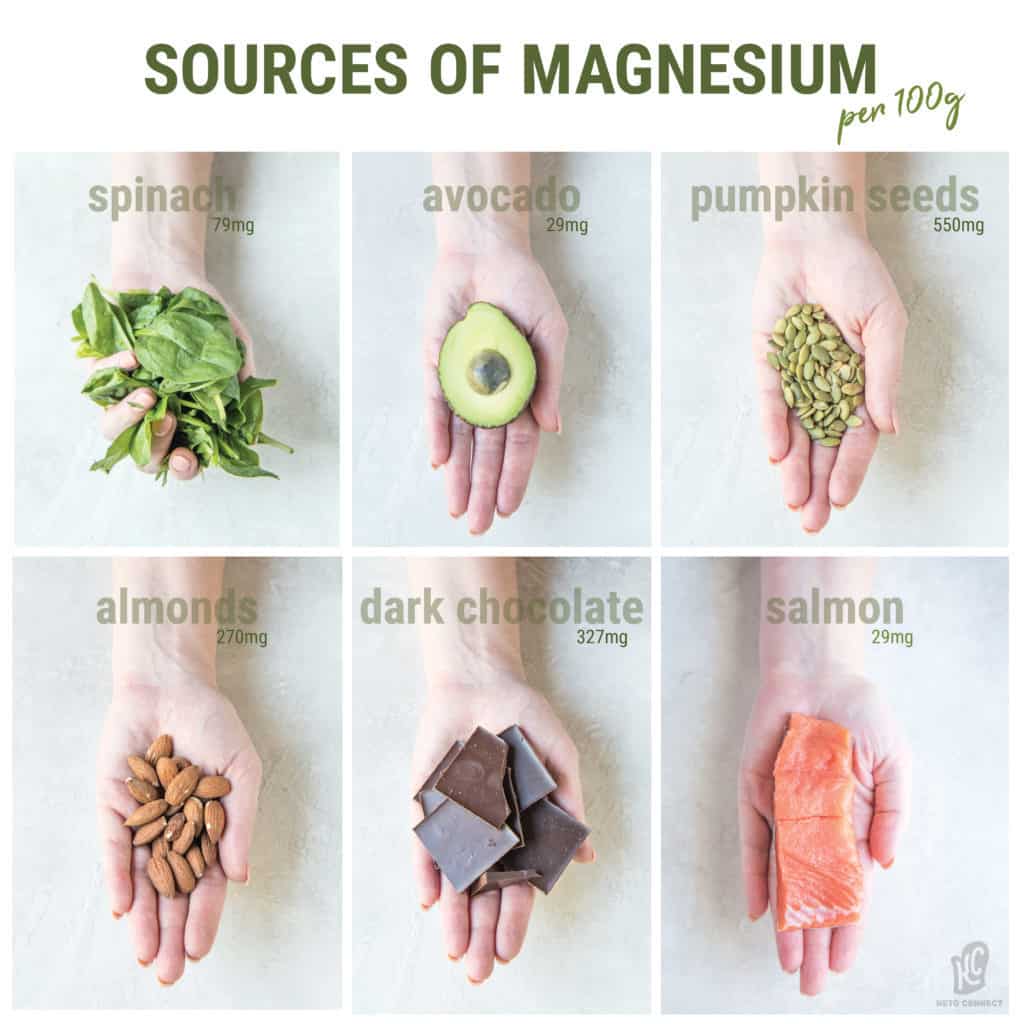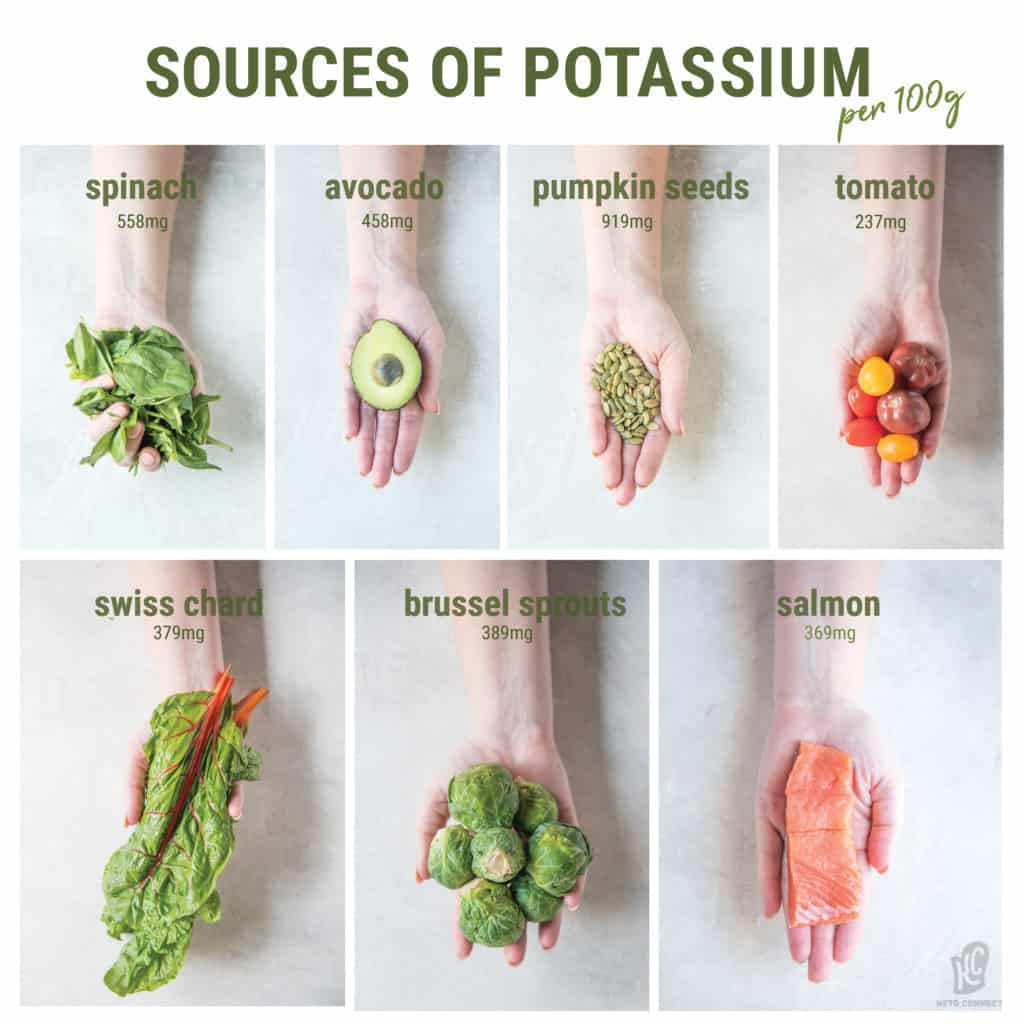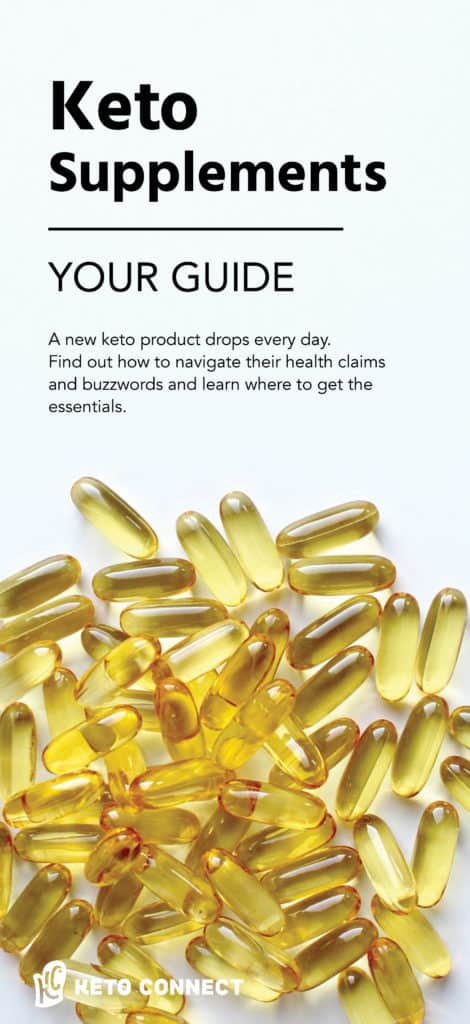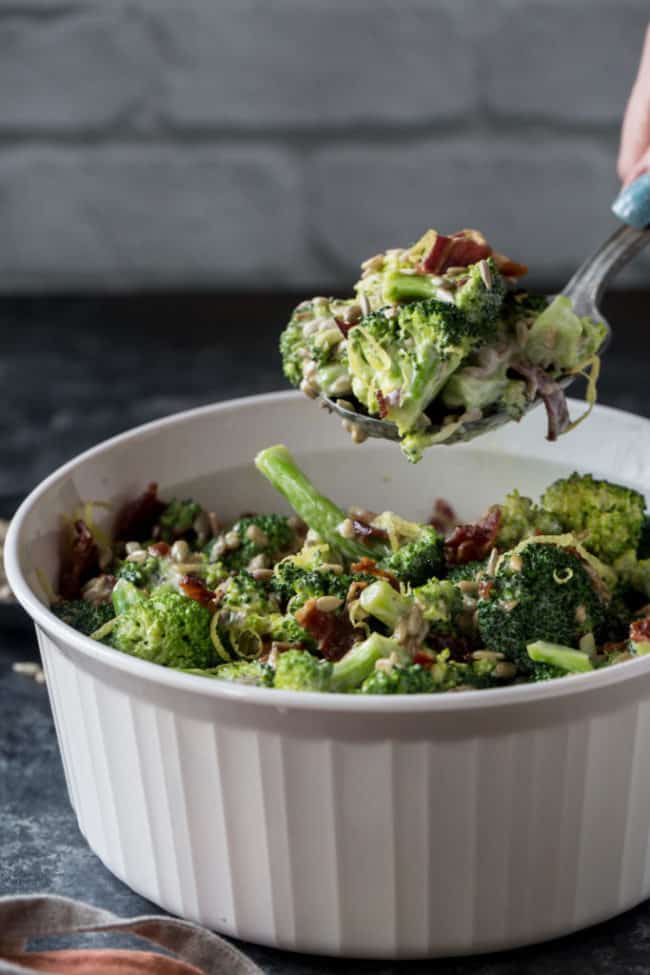KetoConnect’s mission is to help people transition into the keto diet and to make it approachable, but we also like to push ourselves to become healthier every day. On top of taking the standard keto supplements like electrolytes, we also take a few other vitamins and eat certain nutrient dense foods (not super foods!) to help us achieve optimal health.
The Best Supplements to Take on a Keto Diet
This is our list of recommendations based on our own research and trial and error. Check out the video below where we review each supplement.
1. Magnesium
Magnesium is important on a ketogenic diet, especially when first starting because your body goes through an adaptation phase where it holds on to less water which will deplete magnesium. Add on top of that the fact that a high percentage of the population is at risk of developing magnesium deficiency and you could run into problems. We take 400mg of magnesium glycinate per day. We opt for magnesium glycinate because of its high bio-availability.
Food is always going to be the best source of vitamins and minerals, so look at the graphic below for the foods highest in magnesium.

Keep in mind that the “paper value” of the vitamins and minerals in a particular food do not indicate the amount that your body will actually absorb. The magnesium in animal foods like salmon is more bio-available than the magnesium in pumpkin seeds and almonds.
2. Electrolytes
Magnesium can be included as an electrolyte but we thought it was necessary to highlight its importance for #1.
When you’re on a keto diet and your muscles are depleted of glucose, you hold onto much less water than before. You should replenish your body’s electrolytes such as sodium, magnesium, and potassium every day in order to feel your best.
If you are suffering from brain fog, fatigue, muscle cramps or other symptoms of the keto flu, (learn more about the keto flu here) you may not be getting in the proper electrolytes. You can get electrolytes from food, but you can also take these keto supplements.
- Salt or sodium – Just salt your food and you should be good.
- Sports Salts on Amazon is high in all three electrolytes. (Our favorite)
- Dr. Berg’s Electrolyte Powder Pretty expensive, but a solid product.
- KetoVitals – A cheaper option for an electrolyte powder.
- Magnesium Glycinate – Has a slight calming effect, so take before bed for a better sleep.

It’s worth noting that many of the foods that are high in magnesium also happen to be high in potassium. Including foods like spinach, avocado, pumpkin seeds and salmon in your diet can do wonders for your electrolyte levels.
3. Vitamin D3 and K2
Many people are deficient in vitamin D, and according to a study from Cureus, vitamin D deficiency is becoming an epidemic across the United States. If you can get outside during the day to absorb some UVA rays, then do it, but keep in mind there are certain places during the winter months where vitamin D cannot even be made in the skin.
We used the brand Live Wise Naturals and supplement every day. You can also find Vitamin D3 drops at drug stores and health stores.
4. Cod Liver Oil
It can be difficult to get in enough omega-3s and vitamin A, especially if you don’t eat a lot of seafood or organ meats. Cod liver oil can make up for both of these potential holes in your diet. It contains large amounts of high quality omega 3 fats, particularly EPA and DHA, which are proven to reduce inflammation and decrease heart disease risk. Check out our post on essential fatty acids to learn why it’s so important to include omega 3’s on a keto diet.
Cod liver oil also contains adequate amounts of the animal form of Vitamin A, which can be difficult to get through diet unless consuming organ meats. In fact, cod liver oil has been used as a supplement for centuries with great effect.
- NutraPro International Cod Liver Oil – Our favorite
- Carlson Cod Liver Oil – A cheaper option with less Vitamin A
5. MCT Oil
MCT oil is widely known as a must-have keto supplement, but it’s definitely not mandatory. It’s a “nice to have” supplement that can potentially give you more energy and even some metabolic benefits.The reason people like to put it in their bulletproof coffee is because it converts into energy faster than any other fat.
It will raise your ketones, but higher ketones doesn’t mean more fat burn. We prefer to put butter in our coffee since MCT Oil has little nutritional value, but MCT Oil Powder does add creaminess and flavor to coffees and teas.
MCT Oil is nice for a quick burst of energy, but it’s not necessary for a keto diet.
- Perfect Keto MCT Oil
- Perfect Keto MCT Oil Powder – Try it in our Mug Cake Recipe!
- Best MCT Oil for Keto
6. Whey Protein Powder
We prefer to get our protein from real food, but whey protein is a nice keto supplement to have for making baked goods and fat bombs. Occasionally, we add it to smoothies or coffee for a more substantial breakfast. We make our Keto Protein Waffles and Macro Muffins all the time using whey protein powder.
Don’t worry too much about whey protein spiking your insulin. As long as you mix it with fat and some fiber, you should be fine. You can always use a glucose tester to know how it effects you.
7. Collagen Peptides
If you’ve been following our YouTube Channel for some time, you’ll know we didn’t always recommend collagen as a keto supplement, but we’ve changed our minds. After talking to so many people in the fitness and nutrition community, we’ve learned why and where
These days, people are eating mostly the muscle meat, not
- Sports Research Collagen Peptides
- KetoConnect Bone Broth – Not
collagen peptides, but another way to supplement.
8. Exogenous Ketones
Sometimes, people assume the more ketones you have in your body, the more fat you are burning. This is false. Weight loss requires a caloric deficit. The only thing exogenous ketones supply is energy and electrolytes.
The cost of exogenous ketones does not justify using them for the small amount of benefits they may provide. The best situation to use them in is when travelling and your diet and hydration levels or off. Sometimes we even take them after a night of drinking for the electrolytes.
Any claims that these help with weight loss or becoming adapted to a keto diet faster have not been demonstrated by science yet.
That being said, if you want to give some a try for yourself you should never pay more than $3-$4 per serving. Some companies will charge over $6 per serving. Price is not an indicator of quality in this case since they are all using ketones produced by the same company. We recommend perfect keto.
9. Fish Oil
The important thing with choosing a fish oil supplement is that it has to be high quality. The cheap stuff you find at GNC and Walmart is already going to be oxidized by the time it gets to you. Find a trustworthy brand that is transparent about the sourcing of their fish oil.
Fish oil is a good source of omega 3 fatty acids, which are in short supply in our modern diets. In fact, Americans are getting over 20 times as much omega 6 fats compared to omega 3 fats. A fish oil or cod liver oil supplement can help balance this out.
10. Multivitamin
The idea that a pill can supply you with all the essential nutrients you need to thrive every day, is a little bizarre, right?
We recommend getting your vitamins from food, but if you want to take a multivitamin anyways then look for a brand that sources its vitamins from whole food sources. Most multivitamins are made with vitamins derived from plants that have very low absorption rates, or completely synthetic vitamins.
If you are just adjusting to a healthier diet and know you are not eating in a nutritionally complete fashion, then you may want to include a whole foods multivitamin. If you are eating a nutrient dense whole foods diet then a multivitamin is probably doing more harm than good.
Supplements You (Probably) Don’t Need
BCAAs or Amino Acids
BCAAs or Branched-Chain Amino Acids are a group of three essential amino acids – leucine, isoleucine and valine. People like to take BCAAs before the gym, because companies have marketed them as a muscle building supplement.
The truth is, our bodies already have a pool of BCAAs or amino acids stored within us just from consuming protein on a regular basis. Put your money toward more protein you can eat, rather than unnecessary BCAA powders.
Greens Powders
The bio-availability of vitamins from plants is already really low in comparison to animal products, so we presume it’s much lower when you process the plants into a green powder. Greens powders are unnecessary and expensive. Just eat your greens! Try our two favorite veggie sides, Brussel Sprouts and Broccoli.
Keto Supplements You Definitely Don’t Need
Don’t be fooled by any supplement that says “keto” on the label. Buzzwords like super food are really only warning labels for overpriced products you don’t need to be healthy or successful on the keto diet.
MCT Oil or Ketone Pills
The biggest a pill can legally be is one gram, which means you would have to down half a bottle of expensive MCT pills in order to ingest a substantial amount of fat. Don’t fall for this! Get your oil in a bottle. Just because they write MCT Oil on the label, doesn’t mean they’re good keto supplements.
Any supplement with “keto” in the name
From our own research and experience, we can almost guarantee that if a supplement has “keto” in the name it’s probably not worth your time. Supplements should not be related to a particular diet, they should be created with the goal of making the body function better. If a company is marketing something as keto it is probably just trying to capitalize on a popular diet with a lackluster product.
Fiber Supplements
High fiber vegetables are great on a keto diet if you want to enjoy a high-volume meal that’s low in carbs and calories. (They’re also delicious.) But you don’t need fiber to be successful on the keto diet, which is why we don’t recommend drinking a fiber powder just to reach an unnecessary fiber goal.
Fat Burners
If you’re considering fat burners, please take a step back and analyze where your mindset is at. A long-term, sustainable weight loss plan is about diet, not pills! Think long term happiness, not short term.
Detoxes
Don’t let the marketing get to you! Your body detoxes itself and doesn’t need a fancy powder, tea, or juice to cleanse itself of toxins. Detoxes play to the weaknesses of the human mind. We love to eat terribly for weeks or months, only to make it up by doing a 10 day detox. Work on achieving a healthy long-term mindset around your diet.
Super Foods
The word super food has become really popular in recent years. Usually, super foods are from a far-away land, have amazing “healing benefits”, and are expensive. In our opinion, they’re not worth your time or money. You can find all the nutrients you need at the grocery store, in the butcher and produce sections.
In Summary!
Any keto supplements that seem too good to be true, probably are.
- There is only a handful of supplements that are truly necessary on a keto diet. Electrolytes, vitamin D and omega 3 fatty acids make the short list of essentials.
- Don’t be fooled by the growing number of supplements marketed towards ketogenic dieters.
- Get nutrients from whole foods as much as possible, use supplements as a backup plan.
- Don’t fall for cleanses, detoxes and super foods. Be long-term and sustainability minded and you will see long term success.


